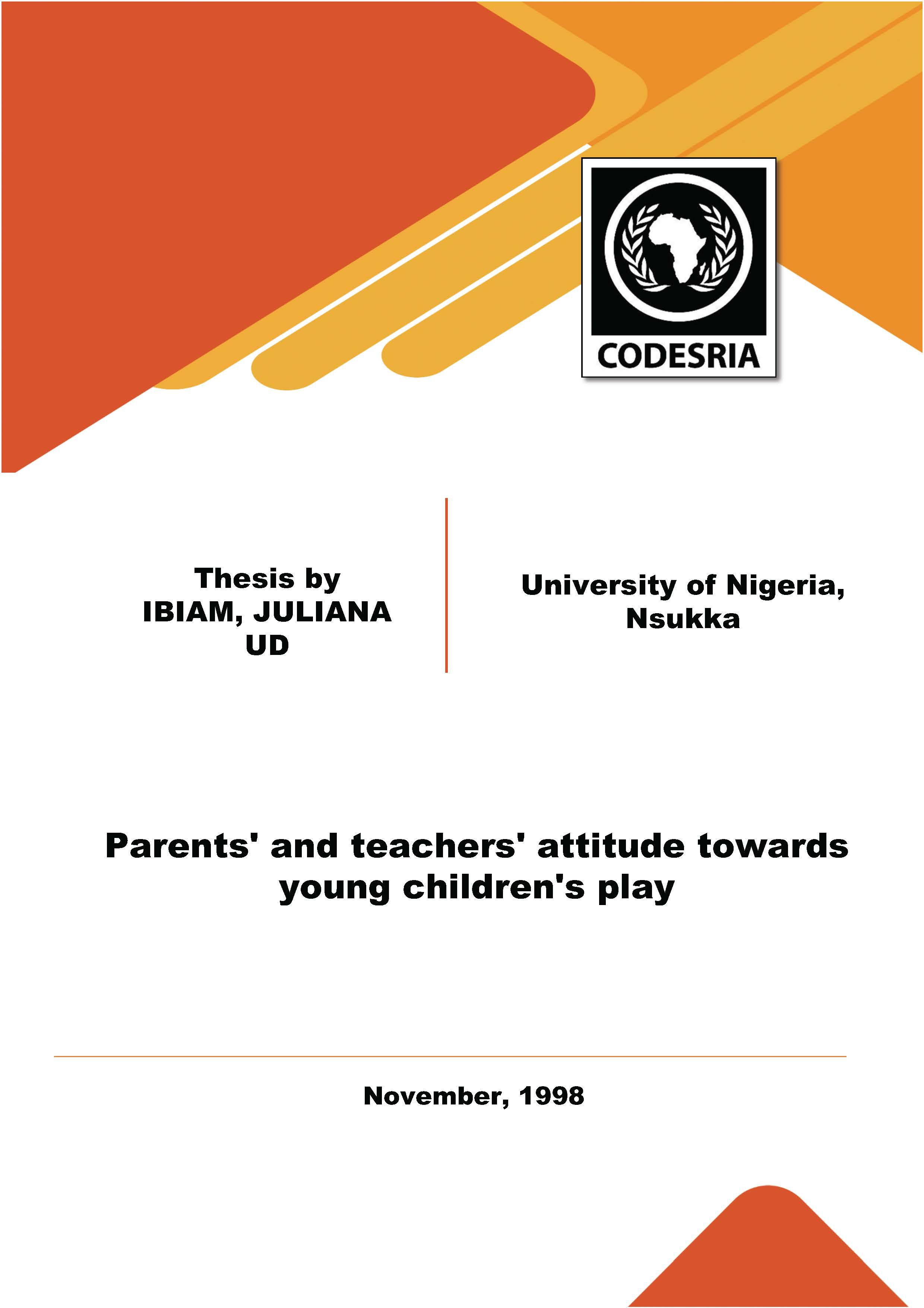Parents' and teachers' attitude towards young children's play
Keywords:
Teaching aids , teachers , child development , games , children , children's playSynopsis
This study sought to find out parents' and teachers' attitude towards young children's play. Two hypotheses and twelve research questions were used to investigate the relationship that exists between gender, location, . occupation, level of education and the attitude of parents' and teachers' towards young children's play. The study design was correlational. A
multistage sampling method was used to select 744 parents and 144 teachers in 6 primary schools and 4 nursery schools in 2 local government areas of former Abia State. A questionnaire was used for data·collection. Frequencies, Means, Standard Deviations, Spearman Correlation Coefficient product and multiple regression were used to analyse the data. Among the findings are that: 1 Parents and teachers have a negative attitude towards young children's play. 2 There is a significant relationship between parents' gender and their attitude towards young children's play. In the case of teachers there was no
significant relationship in all the variables. It was recommended, among others, that parents and teachers should find time to participate in young children's play. Also the Federal and State Ministry of Education, the Loe.al Education Authority, Nigeria Union of Teachers and World Organisation of Early Children Education (OMEP) should organise conferences, seminars and workshops for sensitizing training parents and teachers to the role of play in the overall development of children. The implications for teacher education programmes were discussed.
Downloads
References
Cazden, C. (974). Play with Language and Metalinguistic Awareness. One Dimension of language Experience. International Journal of Early Childhood, 6.10-24.. .
Collier, R.G. (1980). Developing Language Through Play. The Elementary School Journal, 80(2), 88-92.
Come-Krou, B. (1986). The African Conception of Play and its Potentialities for Education. Quarterly Review of Education, 164(60), 188-196.
Dansen, P.R. & lnhelder (1978). Naissance de /'intelligence chez L'Enfant Book de cote d"lvore Hans Huber.
Day, B. (1975). Open Learning in Early Childhood. New York: Macmillan.
Day, O.D. (1985). Contemporary Early Childhood Programme. In Range et al (ed.), Aspect Early Childhood theory to Practice. New York: Macmillian.
Day, O.D. (1985). Early Childhood Education Creative Learning Activities. New York: Macmillian.
Denga, D.I. & Ali, A (1983). An introduction to Research Method and Statistics in Education and Social Sciences. Jos: Savannah publishers Ltd.
Elkind, D. (1984). Misunderstanding About how Children Learn In Richard Miner (eds.), Reading in Education (pp 48:-50) Cruilford: Dushkin.
Eifermann, R.R. (1977). Social Play in Childhood. In R. E. Herron and B. Sutton Smith (eds.), Child's Play. New York: Jonh Willey and Sons.
Erikson, E. (1963). Childhood and Society. London: Routledge and Kegan Paul. Ellis, M. (1973). Why People Play. Englewood Cliffs. N.J.: Prentice Hall. Ellis, M.J. & Scholtz, G.J.L. (1973). Activity and Play of Children New Jersey: Prentice Hall Englewood Cliffs.
EL"Komin, D.B. (1969). Some Results of the study of the Psychological Development of Pre-School Age Children. In Cote et al (eds.), A Hand book of Contemporary Soviet psychology. New York: Basic books.






